

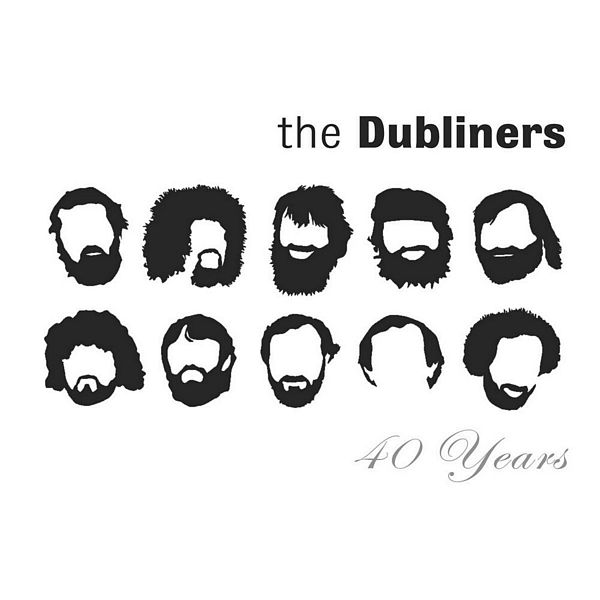 |
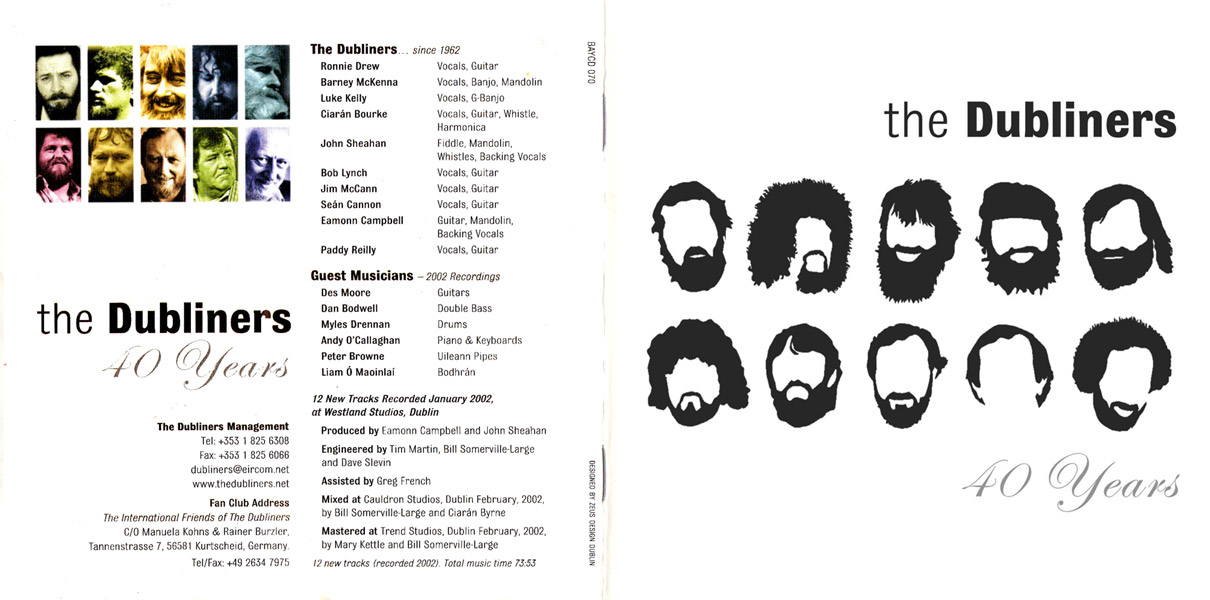
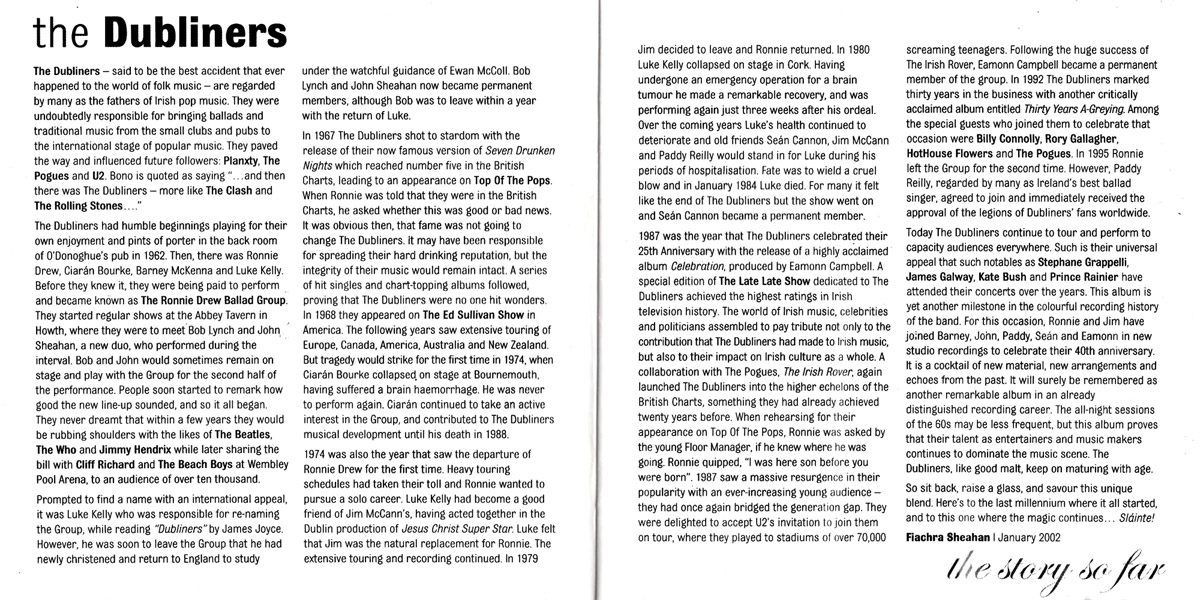 |
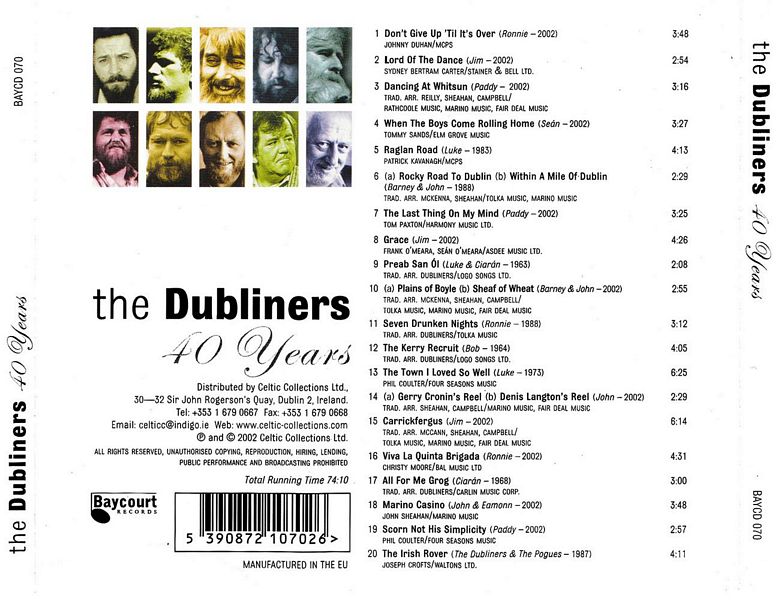
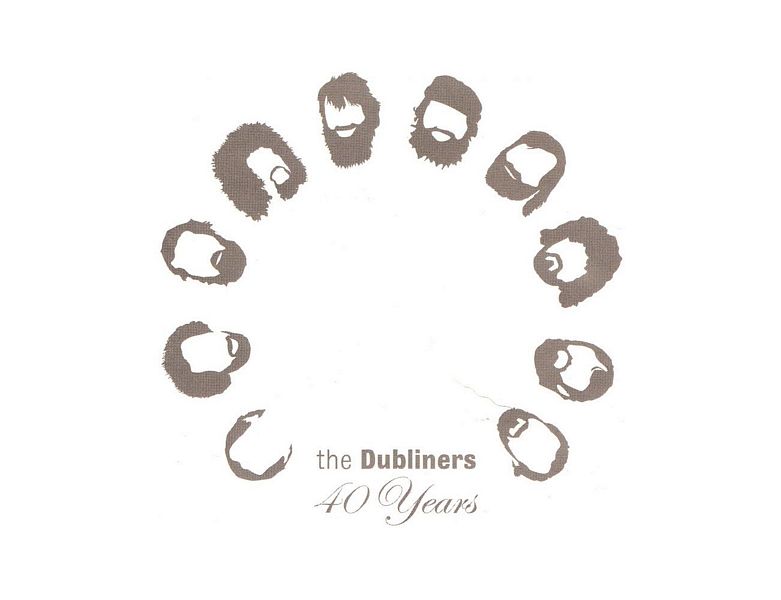
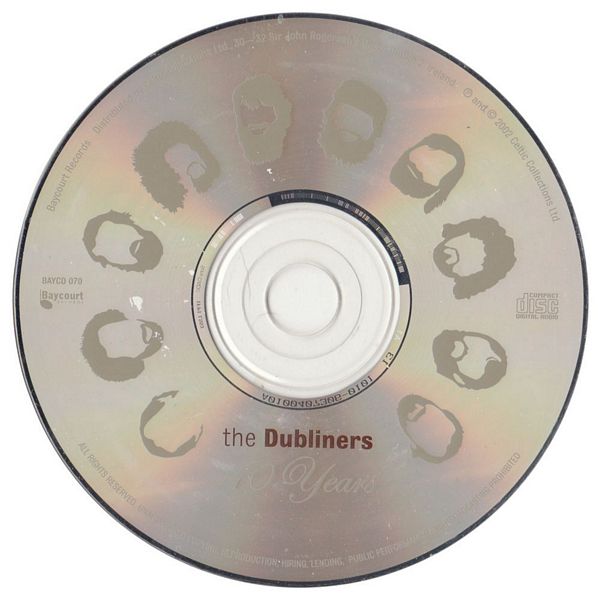 |
| more images |
Sleeve Notes
The Dubliners — said to be the best accident that ever happened to the world of folk music — are regarded by many as the fathers of Irish pop music. They were undoubtedly responsible for bringing ballads and traditional music from the small clubs and pubs to the international stage of popular music. They paved the way and influenced future followers: Planxty, The Pogues and U2. Bono is quoted as saying" … and then there was The Dubliners — more like The Clash and The Rolling Stones … "
The Dubliners had humble beginnings playing for their own enjoyment and pints of porter in the back room of O'Donoghue's pub in 1962. Then, there was Ronnie Drew, Ciarán Bourke, Barney McKenna and Luke Kelly. Before they knew it, they were being paid to perform and became known as The Ronnie Drew Ballad Group. They started regular shows at the Abbey Tavern in Howth, where they were to meet Bob Lynch and John Sheahan, a new duo, who performed during the interval. Bob and John would sometimes remain on stage and play with the Group for the second half of the performance. People soon started to remark how good the new line-up sounded, and so it all began.
They never dreamt that within a few years they would be rubbing shoulders with the likes of The Beatles, The Who and Jimmy Hendrix while later sharing the bill with Cliff Richard and The Beach Boys at Wembley Pool Arena, to an audience of over ten thousand. Prompted to find a name with an international appeal, it was Luke Kelly who was responsible for re-naming the Group, while reading "Dubliners" by James Joyce. However, he was soon to leave the Group that he had newly christened and return to England to study under the watchful guidance of Ewan McColl. Bob Lynch and John Sheahan now became permanent members, although Bob was to leave within a year with the return of Luke.
In 1967 The Dubliners shot to stardom with the release of their now famous version of Seven Drunken Nights which reached number five in the British Charts, leading to an appearance on Top Of The Pops. When Ronnie was told that they were in the British Charts, he asked whether this was good or bad news. It was obvious then, that fame was not going to change The Dubliners, it may have been responsible for spreading their hard drinking reputation, but the integrity of their music would remain intact. A scries of hit singles and chart-topping albums followed, proving that The Dubliners were no one hit wonders. In 1968 they appeared on The Ed Sullivan Show in America. The following years saw extensive touring of Europe, Canada, America, Australia and New Zealand. But tragedy would strike for the first time in 1974, when Ciarán Bourke collapsed, on stage at Bournemouth, having suffered a brain haemorrhage. He was never to perform again. Ciarán continued to take an active interest in the Group, and contributed to The Dubliners musical development until his death in 1988.
1974 was also the year that saw the departure of Ronnie Drew for the first time. Heavy touring schedules had taken their toll and Ronnie wanted to pursue a solo career. Luke Kelly had become a good friend of Jim McCann's, having acted together in the Dublin production of Jesus Christ Super Star. Luke felt that Jim was the natural replacement for Ronnie. The extensive touring and recording continued. In 1979 Jim decided to leave and Ronnie returned. In 1980 Luke Kelly collapsed on stage in Cork. Having undergone an emergency operation for a brain tumour he made a remarkable recovery, and was performing again just three weeks after his ordeal. Over the coming years Luke's health continued to deteriorate and old friends Seán Cannon, Jim McCann and Paddy Reilly would stand in for Luke during his periods of hospitalisation. Fate was to wield a cruel blow and in January 1984 Luke died. For many it felt like the end of The Dubliners but the show went on and Seán Cannon became a permanent member.
1987 was the year that The Dubliners celebrated their 25th Anniversary with the release of a highly acclaimed album Celebration, produced by Eamonn Campbell. A special edition of The Late Late Show dedicated to The Dubliners achieved the highest ratings in Irish television history. The world of Irish music, celebrities and politicians assembled to pay tribute not only to the contribution that The Dubliners had made to Irish music, but also to their impact on Irish culture as a whole. A collaboration with The Pogues, The Irish Rover, again launched The Dubliners into the higher echelons of the British Charts, something they had already achieved twenty years before. When rehearsing for their appearance on Top Of The Pops, Ronnie was asked by the young Floor Manager, if he knew where he was going. Ronnie quipped, "I was here son before you were born". 1987 saw a massive resurgence in their popularity with an ever-increasing young audience — they had once again bridged the generation gap. They were delighted to accept U2's invitation to join them on tour, where they played to stadiums of over 70,000 screaming teenagers. Following the huge success of The Irish Rover, Eamonn Campbell became a permanent member of the group. In 1992 The Dubliners marked thirty years in the business with another critically acclaimed album entitled Thirty Years A-Greying. Among the special guests who joined them to celebrate that occasion were Billy Connolly, Rory Gallagher, Hot House Flowers and The Pogues. In 1995 Ronnie left the Group for the second time. However, Paddy Reilly, regarded by many as Ireland's best ballad singer, agreed to join and immediately received the approval of the legions of Dubliners' fans worldwide.
Today The Dubliners continue to tour and perform to capacity audiences everywhere. Such is their universal appeal that such notables as Stephane Grappelli, James Galway, Kate Bush and Prince Rainier have attended their concerts over the years. This album is yet another milestone in the colourful recording history of the band. For this occasion, Ronnie and Jim have joined Barney, John, Paddy, Seán and Eamonn in new studio recordings to celebrate their 40th anniversary. It is a cocktail of new material, new arrangements and echoes from the past. It will surely be remembered as another remarkable album in an already distinguished recording career. The all-night sessions of the 60s may be less frequent, but this album proves that their talent as entertainers and music makers continues to dominate the music scene. The Dubliners, like good malt, keep on maturing with age. So sit back, raise a glass, and savour this unique blend. Here's to the last millennium where it all started, and to this one where the magic continues … Slainte!
Fiachra Sheahan, January 2002
Ronnie Drew
He was the first one of the Group and sometimes affectionately referred to as "our Daddy" by the rest of the band. He was the first one of the Group to appear on the professional stage Ronnie realised that he wasn't cut out for a nine to five job, especially of the a.m. variety.
He emigrated to Spain where he lived for three years During his time there, he taught English, learned Spanish in the process, and took lessons in the art of flamenco guitar.
On his return to Dublin, he met up with renowned actor, John Molloy, and worked with him in various theatrical roles, singing, acting and playing flamenco guitar. The discipline of this introduction to show business was later to prove of immense benefit when The Dubliners evolved.
Various attempts have been made to describe Ronnie's unusual voice. One writer described it as, "The sound of coke being crushed under a door". Ronnie himself remains uncertain "I'm not sure sometimes", he says, "whether it's a blessing or a curse, but I've been getting away with it for a longtime now".
Ronnie left the Group in 1995 to pursue a solo career.
John Sheahan
Sometimes referred to as, "The quiet one", John is the only member of the Group to have had a formal musical education.
John's introduction to music began at school with the Christian Brothers in Marino. Dublin, where he learned the tin whistle. This experience was shared with Paddy Moloney, now of Chieftains fame, and another classmate, Liam Rowsome, fiddle playing son of the legendary piper, Leo Rowsome. Soon he was to transfer the musical knowledge gained on the whistle to a fiddle he found lying around at home. Enthusiastically supported and encouraged by his parents, he attended the Municipal School of Music in Dublin where he studied classical violin for more than five years. During this time he continued to maintain his interest in Irish traditional music.
Over the years, John has been in steady demand as a studio musician on other artists' records, including those of Kate Bush, Terence Trent D'Arby and Rod Stewart.
In more recent times John has gained recognition as a composer. Many of his compositions have strong characteristics of baroque music and several of these have been arranged for the RTE Concert Orchestra His most famous piece is the Marino Waltz.
Luke Kelly
Born 1940 — Died 1984
The Song of A Bird Alone
Luke Kelly lived much of his life among his own — and yet he too knew a kind of exile: it was the spiritual exile of one who wished for a better world.
Luke found expression for his loneliness. For him singing was as essential as it was for the American blues' singers who found themselves "lonely and afraid in a world they never made". Luke brought home to you that singing had been man's primal mode of expression.
Better than most, Luke Kelly knew what was happening in his own field — and indeed in the fields around it — but he was his own man. Ewan McColl may have inspired him — but only to go his own way. It may seem paradoxical that such a 'bird alone' should gain fame with a group — but The Dubliners were less a group than a meitheal. The Dubliners were all individualists — Luke, Ronnie, Ciarán, John, and Barney were leaves from different trees blown together by the wind that changed the world of music a generation ago. What they had most in common was artistic honesty.
Luke's ambition was to express "the song of his loneliness". He succeeded as much as a mortal can — and in doing so he became an immortal.
Con Houlihan,1984
Barney McKenna
Affectionately known to his friends as Banjo Barney from Donnycarney since he's seldom seen without his beloved instrument.
Barney is unquestionably a natural musician and banjo playing is not only his profession but his hobby too. Authoritative observers throughout the world consider him the best banjo player ever to have emerged from Ireland. In 2001 his contribution to the world of traditional music was officially recognised by The Galway School of Irish Traditional Music who presented him with their Hall of Fame award.
There's a strange kind of logic that runs through much of Barney's conversation and the rest of the band have coined a new word to describe some of his statements — Barneyisms! Once on a particularly turbulent flight to London, Barney was unusually nervous. John Sheahan who was sitting beside him said,
"Listen, Barney, you might as well try to relax — after all, you're not going to go until your number is up", to which Barney replied, "That's all very well, but suppose the pilot's number is up, we'll all have to go with him".
On another occasion, Barney was driving Finbar Furey to Dublin. Finbar was rather uncomfortable with Barney's style of driving and told him to slow down and take it easy — to which Barney replied, "You think this is bad. You should be with me when I'm on my own!" With that kind of humour, you can be sure there's never a dull moment when you're in Barney's company.
Ciarán Bourke
Born 1935 — Died 1988
Ciarán Bourke loved porter. He sang about it, indulged in it and when he built an extension to his Dublin Mountain home, he embedded 2,000 bottles (empty) in a decorative porch. He laughed about his fondness for the black stuff. Ciarán was the scholar of The Dubliners. His father wanted him to have a degree from UCD. He opted out after completing four years in the Faculty of Agriculture.
In the 60s, Ciarán Bourke was one of those rare people who chose the alternative life when it wasn't so fashionable. Ciarán loved the Irish language and it was from his grand voice that we first heard the haunting Se Fath mo Bhuartha. He was a fine musician too — tin whistle, harmonica and guitar. He was the melodic chord to Ronnie's soul songs and Luke's passion.
He was a compassionate man who never dwelt on the material side of life. Life was for living and loving and helping others. Fate dealt a cruel blow in 1974. Ciarán collapsed on stage at Bournemouth, having suffered a brain haemorrhage. He was never to perform again. He continued to take an active interest in the Group, and contributed to The Dubliners' musical development until his death in 1988.
Bob Lynch
Born 1935 — Died 1982
Bob Lynch was an established solo artist in the early 60s, playing the clubs around Dublin when John Sheahan was playing fiddle with various ceili bands. Bob was impressed with John's fiddle playing and immediately saw the potential of combining their talents as a duo. He invited John to his house to explore their musical possibilities. They immediately struck up a strong rapport and Bob was so impressed with their new sound that he put down his guitar and straight away phoned his agent, Peggy Jordan. He asked her to listen while John played a tune — possibly the first ever telephone audition. Bob finished his conversation and announced to John, "we have three gigs next week as a duo."
When Luke Kelly temporarily left The Dubliners in 1963, the rest of the boys invited Bob and John to augment their shows by filling in during their "porter breaks", and by a process of natural organic evolution they just stayed on. About a year later, Bob made a decision not to give up his day job and returned to a successful solo career.
Jim McCann
Having traded the life of a medical student for that of a travelling musician in the early 60s, Jim McCann is one of Ireland's longest serving and best loved entertainers. It was while working in Birmingham on a Summer holiday in 1964 that he
became interested in folk music and began performing as a 'floor singer' around the many folk clubs in that area. On his return to Ireland he joined the Ludlows who were among the top Irish folk groups at that time.
Jim then embarked on a solo career, which involved television shows including The McCann Man. Luke Kelly appeared as a guest on this show. It was during the run of this show that Jim was asked to temporarily join The Dubliners because of Ciarán Bourke's illness. When Ronnie Drew decided to go solo, Jim was invited to become a permanent member of the Group. Jim toured the world with The Dubliners throughout the 70s and since then his career has gone from strength to strength. He has made several TV specials, successful albums and singles; his most famous being Grace which remained in the Irish charts for 36 weeks.
Jim left The Dubliners in 1979 to pursue a solo career.
Seán Cannon
Seán was born in Galway but has spent a good deal of his adult life in England. His wanderings began in the early 60s when he moved to Germany for a year with a view to developing his linguistic ability. During his time there he became interested in folk music.
His next move was to Switzerland where he appeared on several radio and television stations as well as acquiring an excellent command of the French language. With rucksack and guitar in tow, Seán then moved to Spain where he taught both German and French, acquiring in the process fluent Spanish to add to his already established multilingual repertoire. Eventually, he was to settle in England in the late 60s and went on to become a renowned solo artiste, playing the many Folk Clubs that had mushroomed during these folk revival years.
Seán had been a close friend of The Dubliners for many years and appeared with them as a guest artist on a number of occasions before accepting an invitation to join them in the autumn of 1982.
Eamonn Campbell
Eamonn began playing professionally in 1965 with Dermot O'Brien and The Clubmen. During a U.K. tour in 1967, The Clubmen shared the bill with The Dubliners and, during the nightly sessions that followed each concert, a relationship developed between Eamonn and The Dubliners, which led to a lasting friendship. Over the years, he has made numerous guest appearances with the Group.
Eamonn is regarded as Ireland's most successful record producer, having produced hits for Paddy Reilly, Foster and Alien, Brendan Grace, Philomena Begley and, in recent years, he has produced records for American country singer Billy Jo Spears. In 1987 he produced The Dubliners' 25th Year Celebration album and it was Eamonn's suggestion that The Dubliners and The Pogues record a few tracks for the album. This resulted in their hit single, The Irish Rover.
Shortly afterwards, with the opportunity to take part in live concerts, Eamonn cut down on his studio work and joined the Group on a full-time basis.
Paddy Reilly
Paddy Reilly, "the newest Dubliner" has been a close friend of the Group for many years.
As a teenager, his first musical influence was opera. However, it was his attendance at a Dubliners concert in the early 60s that attracted him to the world of folk music and he always cites Luke Kelly as the strongest single influence on him as a solo singer.
What started off, as a hobby — learning and singing folk songs -soon became his profession. His popularity grew rapidly and over the years he has earned the reputation of being Ireland's best loved folk singer. He has that special quality of putting his own personal stamp on a song, making it the definitive version. Paddy has toured extensively and performed in all the major concert halls around the world, from the Sydney Opera House to Carnegie Hall. He has recorded over 15 albums and has had major single hits with The Town I Loved So Well, The Flight of Earls and The Fields of Athenry which remained in the Irish charts for a record 100 weeks.
The social and musical lives of Paddy Reilly and The Dubliners have been closely interwoven over the past 35 years. He has guested with the Group on numerous occasions over the years. Eamonn Campbell has produced most of his albums and John Sheahan has performed as studio musician on many of them.
When Ronnie Drew left The Dubliners at the end of 1995, Paddy Reilly joined the Group.